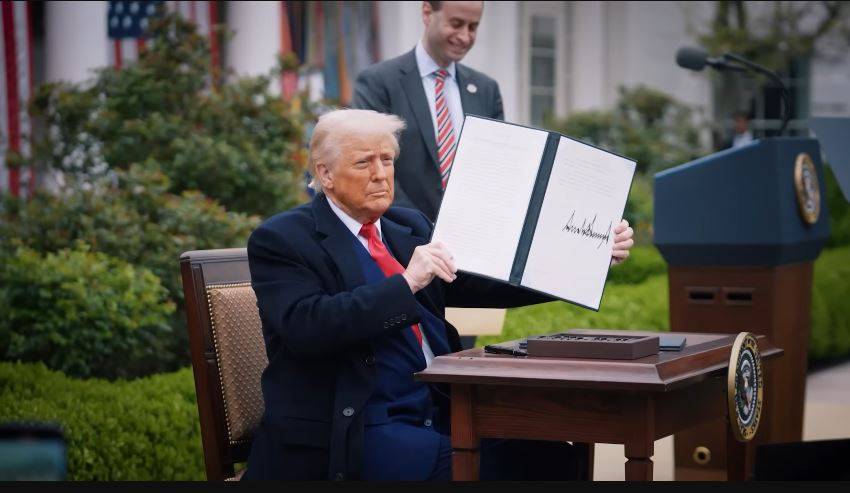
Everything moves as speed of lightning or shall we say at Trumpning speed.
Who’s Investing and How Much?
The United States is witnessing an historic surge in foreign and domestic investment, with commitments approaching $8 trillion—a level never before seen in American history. This wave of capital is being driven by President Donald J. Trump’s “America First” agenda, which has placed a renewed emphasis on manufacturing, advanced technology, and job creation on U.S. soil.
Key Corporate Investment Commitments
Below is a breakdown of the major companies and the amounts they have pledged to invest in the United States, as highlighted in the video and corroborated by recent news and official data:
-
- Apple & Foxconn:
-
- $500 Billion
Apple, in partnership with Foxconn, will build a new server factory in Texas by 2026, marking one of the largest single-company investment commitments in U.S. history.
- $500 Billion
-
- Apple & Foxconn:
-
- SoftBank:
-
- $100 Billion
The Japanese conglomerate has pledged to invest $100 billion over four years, including the launch of Project Stargate—a joint venture with Oracle and OpenAI to build massive data centers, with plans for expansion across multiple states.
- $100 Billion
-
- SoftBank:
-
- Taiwan Semiconductor Manufacturing Company (TSMC):
-
- $165 Billion (total U.S. investment, with $100 Billion as a new commitment)
TSMC is expanding its U.S. footprint, focusing on manufacturing the world’s most advanced AI chips domestically.
- $165 Billion (total U.S. investment, with $100 Billion as a new commitment)
-
- Taiwan Semiconductor Manufacturing Company (TSMC):
-
- Nvidia:
-
- Hundreds of Billions
The leading AI chipmaker is investing at unprecedented levels, supporting the manufacturing renaissance and the development of next-generation semiconductor technologies.
- Hundreds of Billions
-
- Nvidia:
-
- Johnson & Johnson:
-
- $55 Billion
Committed over the next four years to expand its U.S. operations and manufacturing capacity.
- $55 Billion
-
- Johnson & Johnson:
-
- Hyundai:
-
- $20 Billion
Hyundai Motor Group is investing heavily in new and existing U.S. auto plants, solidifying its role in the American automotive sector.
- $20 Billion
-
- Hyundai:
-
- GE Aerospace:
-
- Nearly $1 Billion
Announced a significant expansion of its U.S. manufacturing capabilities.
- Nearly $1 Billion
-
- GE Aerospace:
-
- Eli Lilly:
-
- $27 Billion (additional), totaling over $50 Billion
The pharmaceutical giant is expanding its U.S. manufacturing operations, bringing its total American investment above $50 billion.
- $27 Billion (additional), totaling over $50 Billion
-
- Eli Lilly:
-
- ACGM:
-
- $20 Billion
Investing in shipping and logistics infrastructure across the United States.
- $20 Billion
-
- ACGM:
-
- Clarios (Wisconsin-based):
-
- $6 Billion
Expanding its battery manufacturing operations in the U.S.
- $6 Billion
-
- Clarios (Wisconsin-based):
-
- DAMAC Properties:
-
- Amount Not Specified
The Dubai-based property developer has pledged a significant, though unspecified, investment in U.S. real estate and infrastructure.
- Amount Not Specified
-
- DAMAC Properties:
-
- Auto Industry (General):
-
- Multiple companies, including Honda and others, are shifting production to the U.S., with at least eight new or expanded auto plants announced.
-
- Auto Industry (General):
Strategic and Geopolitical Context
These investments are not occurring in a vacuum. They are part of a broader geopolitical and economic strategy:
-
- Reshoring Manufacturing:
The return of manufacturing jobs and facilities to the U.S. is a central pillar of this investment wave, with companies like Prepac moving operations from Canada to North Carolina and Honda shifting hybrid vehicle production from Mexico to Indiana.
- Reshoring Manufacturing:
Economic and Social Impact
-
- Job Creation:
These investments are expected to create tens of thousands of high-paying jobs, revitalize industrial regions, and provide new training and apprenticeship opportunities for American workers.
- Job Creation:
-
- Technological Sovereignty:
By building advanced semiconductor and AI infrastructure domestically, the U.S. aims to reduce reliance on foreign supply chains and secure its technological future.
- Technological Sovereignty:
-
- Global Confidence in the U.S. Economy:
The scale and diversity of these investments—from Silicon Valley to Wall Street to international partners—signal renewed global confidence in the American market and its leadership.
- Global Confidence in the U.S. Economy:
Conclusion
The current wave of investment, both foreign and domestic, is setting the stage for a new era of American manufacturing and technological leadership. With nearly $8 trillion in commitments and a focus on advanced industries, the U.S. is poised for a renaissance that will shape its economic and geopolitical standing for decades to come.
